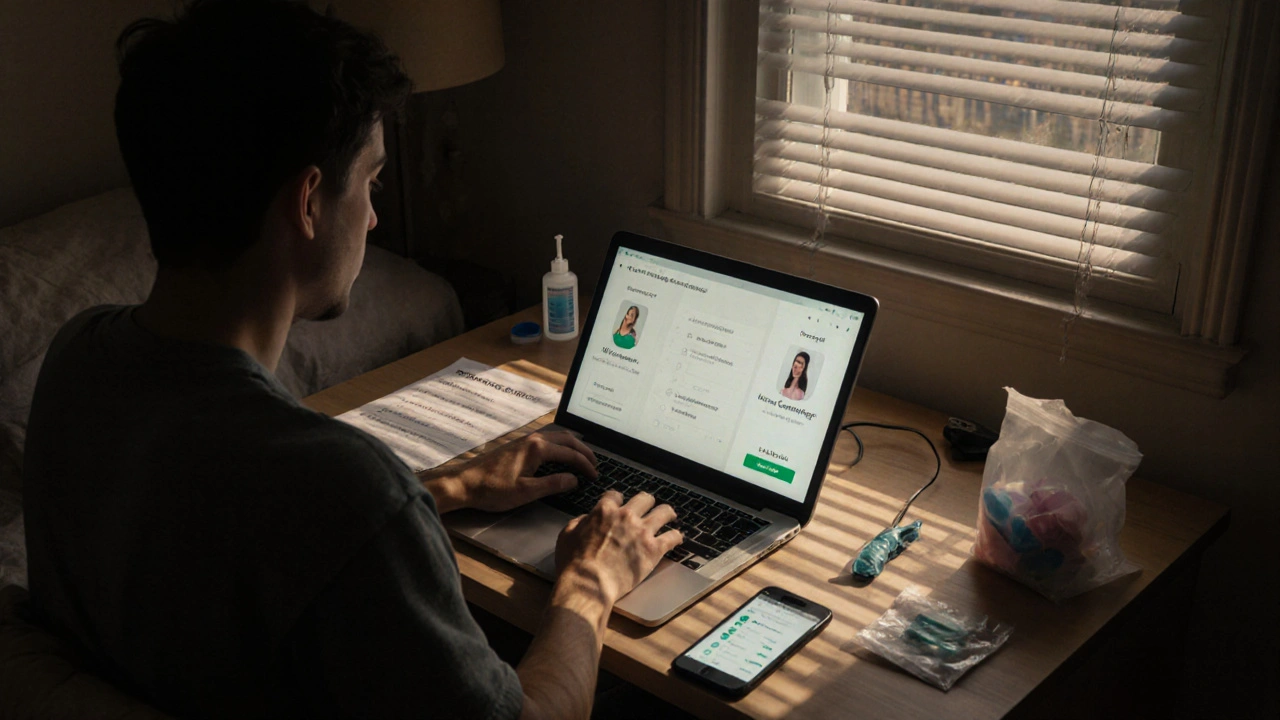You think you know what a day in the life of a sex worker looks like because of movies, headlines, or gossip. But the truth? It’s not what you imagine. It’s quieter. Harder. More human.
What Actually Happens Before the First Client Arrives
Most people assume sex workers just wake up, get dressed, and head out. It’s not like that. For many, the day starts before sunrise. Checking messages. Screening clients. Updating safety protocols. Repeating the same three questions over and over: Is this person legit? Do they have reviews? Have they been flagged by other workers?In London, where rent is high and gigs are unpredictable, many sex workers treat this like a full-time job-with no benefits, no sick days, and no boss to cover for them if they’re sick. One worker I spoke with, who goes by Sam, told me she spends two hours every morning just vetting messages. She doesn’t take walk-ins. She doesn’t answer calls from unknown numbers. She uses a verified booking platform with ID checks and client ratings. That’s not luxury-it’s survival.
The Reality of Workspaces
Where do sex workers work? It depends. Some rent private flats in places like Peckham, Brixton, or Croydon. Others work from home, especially if they’re doing webcam or phone-based services. A few still work on the streets, but that’s become rarer since the rise of online platforms and stricter policing.Indoor work isn’t glamorous. It’s often a small room with a bed, a mirror, a lock, and a panic button. Many workers keep a bag packed with essentials: lube, condoms, hand sanitizer, a charged phone, and a list of emergency contacts. One worker told me she keeps a fake pizza delivery receipt in her wallet. If a client gets aggressive, she shows it and says, “The delivery guy’s waiting downstairs.” It’s not a joke. It’s a tactic.
What a Typical Client Interaction Looks Like
Not every session is the same. Some clients want companionship. Others want intimacy without emotional strings. A few are just lonely. A small number are abusive. That’s why boundaries are non-negotiable.Sam says her most common request? “Just talk.” Not sex. Just conversation. A man in his 60s who lost his wife last year. A student who’s never had a real relationship. A veteran who can’t sleep without someone nearby. These aren’t the stories you hear on the news. They’re the quiet, everyday moments that make up most of the work.
Sex work isn’t about sex. It’s about presence. About being seen. About someone paying you to be there-no judgment, no expectations beyond what’s agreed.
How Workers Manage Their Mental Health
No one talks about the emotional toll. You’re expected to be warm, attentive, calm-even when you’re exhausted, anxious, or grieving. Many workers carry trauma from past experiences. Others struggle with isolation.There are support groups in London, like the English Collective of Prostitutes, that offer peer counseling and legal advice. Some workers attend weekly meetings. Others text a friend after a tough day. A few keep journals. One worker I met writes haikus after each session. “It helps me remember I’m still me,” she said.
Mental health isn’t a perk. It’s part of the job. And yet, most therapists don’t know how to talk to sex workers. Many assume they’re victims. Most aren’t. They’re people doing a job they chose, often because it pays better than retail, cleaning, or caregiving-and gives them control over their time.

How Much Do They Actually Earn?
Earnings vary wildly. A webcam worker in East London might make £300 a week. An independent escort charging £150/hour can clear £1,500-£2,500 a month if they work 15-20 hours. But that’s after fees-platforms take 20-40%, taxes aren’t withheld, and expenses add up: rent, transport, laundry, phone bills, security apps, even makeup.One worker told me she spends £80 a week on laundry alone. Another pays £200 a month for a virtual private network (VPN) to hide her location. There’s no pension. No health insurance. No paid leave. If you’re sick, you don’t work. No money. No safety net.
Why People Choose This Work
People assume sex work is a last resort. But for many, it’s the best option they’ve got.A former nurse in her 40s left her job after burnout. She couldn’t afford to take time off. She couldn’t afford childcare. So she started doing phone sex on weekends. Within six months, she quit nursing. Now she works from home three days a week, makes more than she did before, and has time to care for her daughter.
Another worker, a non-binary artist, uses sex work to fund their exhibitions. “I don’t see it as separate from my art,” they said. “It’s about connection, performance, boundaries. It’s all the same.”
Sex work isn’t chosen because of desperation. It’s chosen because it works.
Safety Is Everything
You can’t talk about sex work without talking about safety. It’s not an afterthought. It’s the foundation.Workers use apps like Shine and Safe4U to share client details with trusted contacts. They record sessions (with consent). They never go to a client’s place without checking the address on Google Street View. They tell a friend when they’re leaving and when they’ll be back.
London has a few safe spaces where workers can meet for coffee, get legal advice, or just decompress. The St. Mungo’s outreach team works with sex workers in Camden and Southwark. They offer free STD testing, trauma counseling, and help with housing.
But the biggest threat isn’t clients. It’s the law. Prostitution isn’t illegal in the UK-but soliciting, brothel-keeping, and pimping are. That means workers are constantly walking a legal tightrope. One wrong message, one wrong location, and they could lose everything.

What You Don’t See
You don’t see the woman who cries in her car after a client cancels at the last minute because she was counting on that money for her daughter’s school trip.You don’t see the man who spends his lunch break applying for a coding bootcamp, hoping to leave sex work in a year.
You don’t see the transgender worker who changes her clothes in a public bathroom because she’s afraid to be seen in a changing room.
You don’t see the quiet pride in how they hold their heads up-even when the world treats them like they’re invisible.
How to Support Sex Workers
If you want to help, don’t donate to rescue organizations that assume sex workers need saving. Don’t push for criminalization. Don’t call them “victims.”Instead:
- Support decriminalization. It’s the only model proven to reduce violence and improve access to healthcare.
- Donate to groups like the English Collective of Prostitutes or UK Network of Sex Work Projects.
- Don’t report workers to the police unless they’re in immediate danger.
- Challenge the stigma. If someone says “all sex workers are exploited,” ask them to meet one.
Sex workers aren’t asking for pity. They’re asking to be treated like people.
FAQ: Your Questions About Sex Work in London Answered
Is sex work legal in London?
Yes and no. Selling sex is legal. Buying sex is legal. But organizing sex work-like renting a flat for multiple workers, advertising online, or having someone manage bookings-is illegal under UK law. That’s why most workers operate alone and avoid any form of “brothel” setup. The law doesn’t protect them; it makes them vulnerable.
Do sex workers get paid well?
It depends. Independent workers in London can earn between £200 and £500 per session, depending on experience and service. Many make £1,500-£3,000 a month working part-time. But after expenses-platform fees, transport, laundry, safety tools, and taxes-net income is often closer to £1,000-£2,000. It’s not rich, but it’s often more than minimum wage jobs offer with the same flexibility.
Are most sex workers victims of trafficking?
No. Studies from the London School of Economics and the UK Home Office show that over 90% of sex workers in the UK are not trafficked. They’re adults who chose this work for reasons like flexibility, higher pay, or control over their schedule. Trafficking exists, but it’s rare compared to the thousands of independent workers. Confusing the two harms real victims and criminalizes people who are simply trying to survive.
Can sex workers have other jobs?
Absolutely. Many work in tech, education, healthcare, or the arts. Some do sex work only on weekends. Others use it to fund education or pay off debt. The idea that sex work is a full-time identity is a myth. For many, it’s just one part of a complex, layered life.
How do sex workers stay safe online?
They use verified platforms with ID checks and client reviews. Many avoid sharing real names, addresses, or photos. They screen clients through text before meeting. Some use apps that automatically alert a friend if they don’t check in. Others record sessions with consent. Safety isn’t optional-it’s built into every step of the process.
Final Thought
A day in the life of a sex worker isn’t about drama. It’s about routine. Discipline. Resilience. It’s about showing up-even when no one’s watching. Even when the world looks away.They’re not heroes. They’re not villains. They’re people. Doing a job. Trying to live.



Daniel Seurer
November 1, 2025 AT 11:17It’s funny how people think they know what’s going on in someone else’s life just because they saw a movie or read a headline. I’ve spent time in London, and I’ve met people who do this work, and honestly, it’s not about the sex. It’s about the humanity. The way one woman told me she keeps a fake pizza receipt in her wallet because she’s been threatened before-that stuck with me. No one talks about the quiet dignity in that. The fact that she’s not waiting for someone to save her, she’s just trying to survive with her dignity intact. And then there’s the guy who writes haikus after every session. That’s not trauma porn. That’s art. That’s a person trying to remember they’re still alive, still thinking, still feeling. The system doesn’t make space for that. The law doesn’t protect that. And yet, here they are, showing up every day, doing the work, managing their own safety, paying their own bills, and still finding ways to be human. We talk about rights, but we don’t talk about respect. We talk about policy, but we don’t talk about people. Maybe we need to start there.
Ashley Bonbrake
November 2, 2025 AT 19:02They’re all being watched. The government, the banks, the apps-they’re all tracking every move. That ‘verified booking platform’? It’s a trap. Every ID check, every review, every message gets logged and sold. The ‘panic button’? It’s just another data point. And the haikus? That’s not therapy. That’s a cover. They’re being conditioned to think they’re in control while the system quietly dismantles their autonomy. This isn’t about choice. It’s about surveillance disguised as safety. You think they’re helping? They’re profiling. And soon, you’ll be next.
Bianca Santos Giacomini
November 2, 2025 AT 19:03Legal gray zone. No benefits. No safety net. High risk. Low protection. The system is designed to fail them. They’re not victims. They’re statistics with a pulse.
Shane Wilson
November 2, 2025 AT 21:58It is, without a doubt, a profoundly moving and meticulously documented account of an often-misunderstood profession. The emphasis on agency, autonomy, and the structural barriers imposed by legislation rather than societal stigma is both academically rigorous and deeply humane. The anecdotal evidence presented-particularly regarding the use of safety protocols, emotional labor, and the economic calculus underlying individual choices-aligns closely with findings from peer-reviewed sociological studies conducted in urban centers across Western Europe. One might argue that the most compelling aspect is not the economic disparity, but the psychological resilience demonstrated by individuals who navigate systemic neglect with extraordinary discipline. It is imperative that public policy shift from moralistic frameworks toward evidence-based decriminalization, as the current legal architecture actively exacerbates vulnerability rather than mitigating it. Thank you for this contribution.
Darren Thornton
November 3, 2025 AT 00:46You wrote 'client ratings' but meant 'client reviews.' Also, 'London has a few safe spaces'-that’s vague. Which ones? You mentioned St. Mungo’s but didn’t clarify if they’re government-funded or NGO-run. And you say 'most workers operate alone'-but what’s the exact percentage? You cite LSE and Home Office but don’t link the studies. And you say '90% are not trafficked'-but trafficking definitions vary by jurisdiction. Did you use the UNODC definition? Also, 'fake pizza delivery receipt'-is that documented in any academic paper or is that anecdotal? You need citations. This reads like a blog post, not journalism.
Deborah Moss Marris
November 3, 2025 AT 06:01Shane, you’re right-it’s humane. But you’re missing the point. This isn’t about being moved. It’s about acting. The law isn’t broken-it’s weaponized. Decriminalization isn’t a suggestion. It’s a necessity. Don’t just thank the author. Donate to the English Collective of Prostitutes. Call your MP. Stop calling them victims. Stop reporting them to the police. Stop pretending this is a moral issue when it’s a human rights one. If you’re not part of the solution, you’re part of the silence that keeps them unsafe. This isn’t about empathy. It’s about justice. And justice doesn’t wait for perfect grammar or perfect citations. It waits for people who refuse to look away.